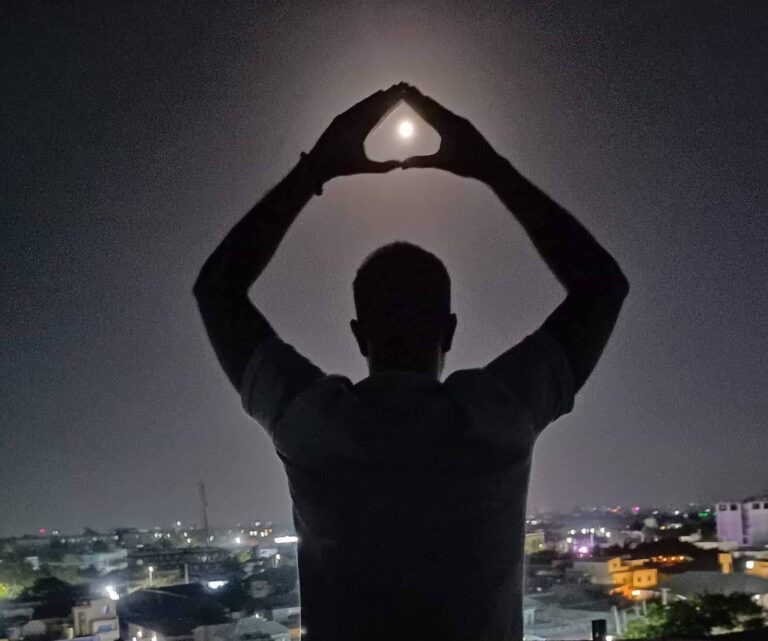Oodan was now behind them. The three women walked in hastened long strides. It was dark, silent and cold. A bright half moon was hovering over their heads – they were oblivious to its presence and the dim light that was spread in the night sky. Soon it will be daybreak and they have to make sure they reach the town before the miserable town-dwellers wake up with their noise and buzz. The women walked. And they walked. Their strides now hastened even more; their legs moved fast in a choreographed rhythm; their feet struck the earth in unison. The women walked. And they walked. They were indifferent to the engulfing darkness and the profound silence; they were not bothered by the insect, birds and other animal sounds. In the distance, they could hear and sense the fastened walk of other milkwomen.
Muumina was the first in the caravan of three milkwomen carrying goat and cow milk on their back to Beled Xaawo and Mandheera every day. She was the youngest. She was tall and slender in figure with protruding cheekbones. Her garbasaar was around her neck and partly floating in the air. Barwaaqa was following Muumina closely. She was the oldest of the three women. She was dark in complexion but had a beautifully glittering skin even in the dark moon light. Barwaaqa had three sons and two daughters; her eldest son went away with his father in herding the camels into the lush and green lands of Baardheera, her youngest daughter was toddler learning to walk. Magaala was the last. She carried more milk today to the market than Muumina and Barwaaqa. She followed her two friends closely. She stiffened her neck to balance the heavy weight of the milk she was carrying; she breathed heavily – but walked steadily, maintaining her stoic composure under the heavy burden.
The three women walked. And they walked. Daybreak was near. The moon lost its light; the stars started to disappear. Light was invading the land from the east. The three women walked. And they walked. They passed through several villages: Warriiriyaale; Bannaaneey; Malmaleey; Xamara; Uunsi; Muduloow; Gantaama; Ceelmirgis; Caanoole; Bilcisa. They were joined by other milkwomen from these villages and other camel encampments scattered all over the land. Their caravan expanded in numbers. Their silence was broken with occasional greetings: “ar ma nabad baa?”, “see lagu baryay?”, “ar Muumina i suga waan soo socadaayee!”
The sun rose lazily on the horizon. The milkwomen were in the vicinity of Beled Xaawo; they could hear the snoring of the still-sleeping town people when they arrived in the marketplace.
***
The market place, which was called Suuqa Xareed Colhaye, was full with people: milkwomen, stall sellers, hawkers, buyers, sellers, children, and marauding goats and sheeps. Muumina mumbled “bismilaahiyoow! This is chaos and hell” as she put down the heavy jerry cans of milk she was carrying. Barwaaqa and Magaala were indifferent to Muumina’s exclamation as they putted down their own jerry cans. The sun was now up in the clear sky, chasing away the beautiful white clouds. Muumina went to a nearby eatery and bought canjeera and shaah for herself and her two friends. “Yesterday I bought for you breakfast and you didn’t pay me my money” Muumina complained. Barwaaqa and Magaala glanced at each other with smiles. “You will be paid Muuminooy” said Magaala as she sipped the hot tea. “Your clan hasn’t still paid the blood money of my cousin Ugaas” Barwaaqa said sarcastically with a restrained smile. Magaala laughed, but looked at Barwaaqa with reprimanding eyes. “Hooyda, I don’t care about horny men who kill each other, you two will pay me my money” Muumina said as she sold milk to her first customer of the day.
The market place was crowded and loud. Red dust was floating in the air whenever the wind blew. The milkwomen sat under tall acacia trees with no leaves; there were no shadows offered by the acacia trees but the women still sat under them. Every spot under the acacia trees were contested. Those who could not find a place would sit in the open blistering sun; they would fold and put their garbasaar on their heads and protect their face from the punishing sun. Barwaaqa saw another milkwoman in the far distance and greeted her by waving her hand. “Sareeyo was divorced” she told her two friends in a low voice. “Ar wallaahi dheh” Magaala and Muumina responded in a similar tone. Magaala felt pity and sorry for Sareeyo who was busy cleaning her jerry cans. “That girl suffered” Magaala said with a sorrowful face. “Her previous husband was a good man, I was told; he worked in Garbahaarreey as a watchman” Muumina explained. “But he couldn’t father a child with her, they say” Barwaaqa said with a pity mood. Silence fell over the three women. Sareeyo’s divorce affair captivated their spirit and mood. “This is what happens when you have bad brothers and relatives. Why do they concern with themselves even if your husband cannot father a child? And this new husband who divorced her was beating her, Shugri told me,” Magaala seemed angry. Muumina and Barwaaqo were surprised by this new revelation.
Soon the three milkwomen left the market and headed for the border; they had served their customers in Beled Xaawo, and now they had to take their milk to Mandheera before it is noon and too hot. Similarly, other milkwomen were also heading to Mandheera – they almost seemed running and racing, but still walked with ease. The border that separated Beled Xaawo and Mandheera consisted of two small custom buildings. Two soldiers were standing in the Mandheera side holding their guns tight while they talked; they were indifferent to the milkwomen passing by them. While the soldiers questioned other people crossing the border, they never stopped or bother with the milkwomen; maybe, they never wanted to stop them since the milkwomen were always in a hurry. Moreover, the soldiers knew how to detect who was a milkwoman and who was not a milkwoman. The milkwomen were different: they wore dirac and garbasaar only; they were all slender in figure; they walked fast with purpose; they seemed not to be scared of the soldiers; they walked in groups and talked, and chatted and giggled happily amongst themselves. They were different it seems from all the people in Beled Xaawo and Mandheera.
On the Beled Xaawo side of the border, uniformed school children played football border stretch. There were no soldiers brandishing guns with authority. The custom buildings lay in ruins.
***
The market in Mandheera was larger and more crowded than the one in Beled Xaawo. Milkwomen from villages and camel encampments in Mandheera, Beled Xaawo and Suuf flooded the market: the noise was deafening and reverberated around; crowds of people rubbed shoulders in every direction. Muumina, Barwaaqa and Magaala settled in a nearby wall with an elongated shadow. Magaala bought hot tea from a nearby tea stall for herself and her friends. The women were happy; soon they were selling their milk to customers; they talked and laugh with other milkwomen and buyers – they were contributing to the chaos and the noise. This was their world; this was the ambience they craved every day.
All of a sudden there was shouting in one tea stall. “The mad man is here” shouted Barwaaqa with a big smile and surprise on her face. A man had an argument that led to shouting exchange with one of the milk buyers: a woman with a red dress and a beautiful white hand bag. The woman, who was very angry, took her milk and left; the milkwomen were laughing at her antics and argument with the mad man. The mad man was tall and wore a worn out macawiis and a dirty brown shirt. He was very thin. His eyes were sunken and red. The milkwomen of the market called him Gacaloow – or maybe that was the name they gave him out of affection. No one knew who Gacaloow was; who were his parents or his clan; where he came from. He was a mysterious man who lived in the market. The milkwomen gave him food, tea and milk. He would occasionally help them – and he always made them laugh with his antics and behaviours. He also made fun of the milk buyers which made them angry but would make the milkwomen laugh and giggle.
Soon it was noon and the sun was scorching the land and the people. The milkwomen sold their milk. The few who had milk in their jerry cans would drink them amongst themselves, and share some with Gacaloow. The shadows have disappeared; and the few market stalls become overcrowded with the milkwomen, other sellers, and buyers of different goods. “Gacaloow, why have you not married?” asked one of the milkwomen to make Gacaloow talk. He smiled but remained silent. The other milkwomen remained silent. They waited for his reply. “I carry my wife in my heart; she is within me; I don’t need another woman” Gacaloow almost shouted out. The milkwomen laughed out loudly; they were excited. Gacaloow was indifferent to their reactions. “What is the name of this wife of yours, Gacaloow?” asked Magaala. “Does she have your children?” asked another milkwoman. “Which clan is she?” asked another milkwoman who was almost laughing. Gacaloow was silent. The milkwomen knew to remain silent and be patient until Gacaloow replies. “I only see her in my dreams, and she is very tall and big. I don’t know her clan. In her world, there are no clans” Gacaloow replied with a low voice. The milkwomen burst with laughter. Barwaaqa was shaking her head and laughing. Gacaloow was also laughing. “Acuudubillaahiyoow!” remarked an older milkwoman.
The call for Casar prayer engulfed the whole marketplace. The milkwomen were preparing to leave; they bought food for their families. One woman bought tea and rice for Gacaloow. The market people were dispersing. Tabliiq men were passing through the market. “Don’t forget to pray before you go caanooleey” said one of them in a polite voice while greeting the milkwomen with a nod and a smile. “Do these women even pray?” said a man with big beards who was also going to the nearby mosque. “Caanooleey diin ma lahan” he added with a contemptuous look. The Tabliiq men were indifferent to the man’s remarks; they looked at the women with sympathetic eyes. The women seemed unscathed by the man’s offensive words. Magaala maintained her composure. Barwaaqa was furious but said nothing. “Aakhiro nimaan geel laheyn lama amaaneyn, adeeroow” replied Muumina. “Our clan will not go to hell,” said another milkwoman with a big smile. Gacaloow laughed in agreement. The milkwomen laughed.
In groups, the milkwomen left the Mandheera market. They will cross the border. They will pass through Beled Xaawo. And they would walk to their villages and camel encampments. The sun was going down; the day heat diminished. The music of BBC Somali was playing in every household as they passed through the neighbourhoods. Boys were playing football in the border crossing. The soldiers were gone. The milkwomen walked. And they walked. Magaala will reach Oodan while her children are asleep.
_________________________
By Abdirashid Diriye Kaalmooy; a teaching fellow at Ibn Haldun University, Istanbul.



